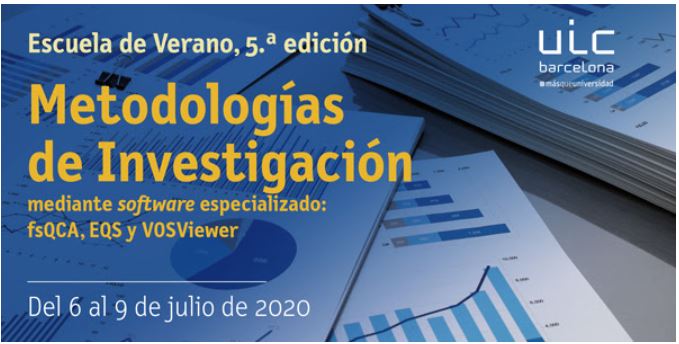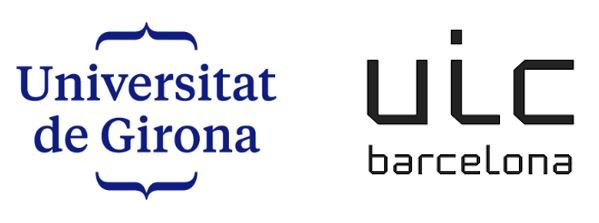The training of professionals specializing in research methods applied to business and economic studies have been increasing. The synthesis of new tools and the development of better, more efficient and sustainable business processes is becoming a strategic differentiating factor for both companies and the academia creating more sustainable products, economical and environmentally friendly, thus satisfying the demands of a market increasingly aware and demanding with the origin and nature of the products they consume.

Fifth edition of the UIC Barcelona Summer School on Research Methodologies (EVUMI)
Course: Introduction to Qualitative Comparative Analysis (QCA) through the use of fsQCA software
Schedule: Monday July 6, from 10.00 h to 13.00 h and from15.00 h to 17.00 h
Professor: Ph.D. Jasmina Berbegal
In recent years this methodology has gained followers and today is presented as a mixed method to help the phenomenon being studied to be understood better, while taking into account all its dimensions and complexity. The aim behind this course is to provide an initial taster of this methodology. For that reason the theoretical grounding of QCA will also be looked into, its objectives, as well as how to decide which situations to apply it in. Through the use of practical cases there will be an explanation of how to prepare a database and how to analyse results. The software to be used is fsQCA.
The course will be taught by Dr Jasmina Berbegal, a Professor from the Faculty of Economic and Social Sciences at UIC Barcelona. She was formerly a Fulbright Visiting Scholar at Haas School of Business at the University of California, Berkeley (USA) and a Visiting Research Associate at the Institute of Education (University College London, UK). She is currently an associate editor of the Journal of Innovation & Knowledge, and a member of the editorial board for Management Decision, Journal of Business Research and Intangible Capital. Her research focuses on the technological transfer between universities and businesses, entrepreneurship and business innovation processes.


2. Course: Application of structural equation models to business research using EQS software.
Schedule:
- Tuesday July 7, from 10.00 h to 13.00 h and from15.00 h to 17.00 h
- Wednesday July 8, from 10.00 h to 13.00 h
*From 3pm to 5pm, an optional workshop will be held to complement the course.
Professors: Dr. Marta Mas, and Dr. Frederic Marimon.
This seminar is highly practical. The seminar will start with a revision of theoretical aspects of Structural Equation Modeling (SEM). Practical details about the use of specific EQS software are described below. In the last part various real situations will be resolved by applying the knowledge developed by using EQS. At the end of the day enough knowledge will have been gained to work with a database and evaluate the model proposed by the researcher.
The course is taught by Dr Frederic Marimon and Dr Marta Mas:
Frederic Marimon is a full professor and Planning and Quality Vice-president in the Faculty of Economic and Social Sciences. The main field of interest in quality management, tackled from different areas: standardised quality management systems (ISO 9000), quality management system models (EFQM), evaluation of the quality of services, particularly online services, analysis of the dissemination of different management standards, analysis of quality dimensions in different sectors such as healthcare services, online banking, online travel agencies or online supermarkets.
Marta Mas is a tenured professor in the Faculty of Economic and Social Sciences, and dean of the same faculty. Her teaching mainly focuses on strategic marketing and human resources. Similarly, her main lines of research cover areas related to knowledge management, strategy and corporate missions. She has also undertaken various quantitative research projects by measuring quality in different sectors and types of company.
To reserve a place, send an email to mgarciaz@uic.es

3. Course: Introduction to bibliometric analysis using VosViewer software
Schedule: Thursday July 9, from 10.00 h to 13.00 h and from 15.00 h to 17.00 h
Professor: Anna Akhmedova, UIC Barcelona.
Bibliometric tools provide better understanding of the evolution of an area, as well as help identify emerging areas of research. The combination of different types of bibliometric analysis has become a literary trend. The aim of this seminar is to acquire theoretical and practical knowledge, using different types of bibliometric analysis. VosViewer software will mainly be used.el software VosViewer.
Anna Akhmedova is a lecturer at UIC Barcelona. She recently completed her PhD in philosophy (awarded cum laude) at UIC Barcelona and completed a postdoctoral stay at IESE, affiliated to the University of Navarra. She took a double Master’s Degree in International Business at CEMS Global Alliance in Management Education (FT 2nd for 2011/2012), was a student at GSOM SPbU (Russia) and at Sydney University Business School (Australia). She has a trajectory of proven success in the consultancy and marketing industries in Russia, Spain and Australia. To date she has published various articles in some of the main academic and business journals.
What training activity reveals?
But that didn’t explain the separate tracks along which the volcanoes formed.
Scientists have seismic evidence that the deep part of the mantle is a graveyard where long ago slabs of earth were subducted, creating separate regions with different chemical compositions that eventually made their way to the surface in a hot mantle plume as the core heated the rock into magma.
Bottom line
By examining data from the two volcanoes, Mr. Jones and his team suggested an alternative: The chemical signature, along with this double-track volcanism as it’s called, occurred three million years ago when the plates above the hot spot shifted direction, moving north.
This shimmy rearranged zones of magma that are heated under different pressures in the shallower part of the mantle — when they cool, the volcanic rock that results reflects this difference. Previously stacked on top of one another, the movement of the plates exposed now geographically separates magma zones that fed the volcanoes individually.
